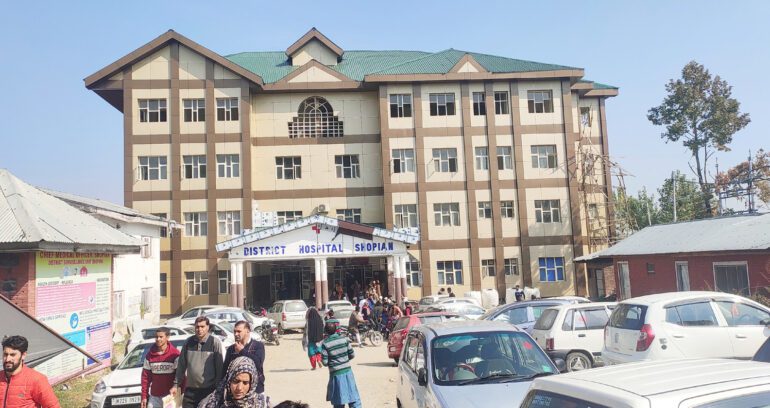TL;DR:
- District Hospital (DH) Shopian implements AI tools in its Radiology department for more efficient diagnoses.
- AI technology can instantly detect abnormal areas in X-rays with over 90% accuracy, easing the workload of radiologists.
- The benefits of AI integration include more accurate classification, enhanced analysis, and quicker results.
- Patients appreciate the advanced medical facilities, enhancing healthcare in the district.
- AI is transforming healthcare by improving diagnosis accuracy and reducing false positives.
- AI-powered tools analyze medical images and patient data to identify diseases earlier and detect patterns.
- AI demonstrates higher accuracy than human radiologists, particularly in breast cancer identification.
- AI can also analyze patient data from various sources, aiding in the identification of at-risk individuals.
- AI has the potential to revolutionize disease diagnosis, improving patient outcomes and reducing healthcare costs.
Main AI News:
In a remarkable move towards advanced healthcare, the District Hospital (DH) Shopian, operating under the Directorate of Health Services Kashmir, is set to employ artificial intelligence (AI) tools in its Radiology department. The pilot project, known as qXR, aims to enhance the efficiency of diagnoses by utilizing AI technology to analyze X-rays.
With an astounding accuracy rate of over 90%, the AI-powered system can instantly identify abnormal areas in X-rays, streamlining the diagnostic process for radiologists. This innovative approach showcases how artificial intelligence is revolutionizing the medical field, providing intelligent computing solutions to practical healthcare problems.
The introduction of AI at District Hospital Shopian brings forth numerous benefits for radiologists, easing their workload and enhancing their capabilities. The key advantages include more accurate classification of abnormalities, improved analysis of medical images, and faster generation of results. By harnessing the power of AI, radiologists can now make diagnoses with greater precision and efficiency, ultimately benefiting the patients under their care.
The implementation of these cutting-edge medical facilities has been widely appreciated by the patients in Shopian, who acknowledge the efforts of the Jammu and Kashmir administrations. They express their gratitude to Administrative Secretary Bhupinder Kumar, Deputy Commissioner Shopian, Director of Health Services Kashmir, Chief Medical Officer Shopian, and Medical Superintendent of District Hospital Shopian. This significant step ensures that DH Shopian remains at par with other leading District Hospitals in the Union Territory, enhancing healthcare services in the district.
The impact of artificial intelligence on the healthcare industry is rapidly transforming diagnosis procedures. AI-powered tools are being employed to analyze medical images, patient data, and other relevant information, enabling clinicians to make more accurate diagnoses in less time.
One area where AI demonstrates great potential is in medical imaging. Systems powered by AI algorithms can effectively analyze various medical images, including X-rays, CT scans, and MRIs, with a remarkable level of accuracy. This enables early detection of diseases, when they are most treatable, and reduces the occurrence of false positives.
A study published in the prestigious journal Radiology reported that an AI algorithm successfully identified breast cancer on mammograms with an astonishing accuracy rate of 96%. This outperforms the average accuracy of human radiologists, which typically stands at around 85%. The integration of AI technology into the field of medical imaging promises significant advancements in diagnosis capabilities.
Moreover, AI is also being utilized to analyze patient data from diverse sources, such as electronic health records, clinical trials, and research papers. By leveraging this vast pool of information, AI-powered tools can help clinicians identify intricate patterns and trends that may evade human perception.
For instance, Google DeepMind developed an AI-powered tool capable of identifying patients at risk of developing sepsis, a life-threatening condition, with an accuracy rate of 90%. This tool is currently employed in hospitals worldwide, assisting clinicians in the early identification and treatment of sepsis.
Although AI in healthcare is still in its nascent stages, its potential to revolutionize disease diagnosis is undeniable. By equipping clinicians with more precise and timely information, AI technology has the power to improve patient outcomes while simultaneously reducing healthcare costs. The future of healthcare is undeniably intertwined with the promising prospects offered by artificial intelligence.
Conclusion:
The integration of artificial intelligence in radiology at Shopian Hospital marks a significant milestone in advancing healthcare services. The implementation of AI tools for efficient diagnoses signifies a growing trend in the market, where cutting-edge technology is playing a crucial role in transforming the medical domain. The use of AI-powered systems in medical imaging and data analysis holds tremendous potential to revolutionize disease diagnosis, enabling clinicians to provide more accurate and timely diagnoses, leading to improved patient outcomes.
This adoption of AI technology sets a precedent for other healthcare institutions, encouraging them to explore innovative solutions that can enhance healthcare delivery and improve overall patient care. The market for AI in healthcare is poised for significant growth as more institutions recognize the immense benefits it offers in terms of accuracy, efficiency, and cost-effectiveness.

